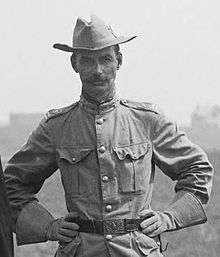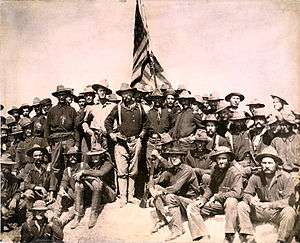Woodbury Kane
| Woodbury Kane | |
|---|---|
 | |
| Born |
8 February 1859 Newport, Rhode Island |
| Died |
5 December 1905 (aged 46) New York City |
| Cause of death | paralysis of the heart |
| Resting place | Kane family plot, Newport Rhode Island |
| Residence | New York, New York |
| Nationality | United States |
| Education | Harvard University |
| Occupation | yachtsman, bon vivant |
| Known for | Rough Riders |
| Spouse(s) | Sallie Hargous-Elliot |
| Parent(s) | Delancey Kane and Louisa Langdon |
Woodbury Kane (8 February 1859 – 5 December 1905) was a noted yachtsman and bon vivant, and member of Theodore Roosevelt's Rough Riders. A director of the Metropolitan Register Company, Kane served aboard the Columbia in the 1899 America’s Cup race. He also was a noted hunter of big game, both in North America and South Africa.
He was a member of the New York Yacht Club (for many years serving on the club's America’s Cup committee), the Metropolitan Club, the Knickerbocker Club, the Racquet Court Club, the Seawanhaka Corinthian Yacht Club, the Meadowbrook Hunt Club, the Hudson River Ice Yacht Club, the Larchmont Club, and the Yacht and Country Club.
Biography
Early life and education
Kane was one of eight children of Oliver Delancey Kane, of Newport, Rhode Island, and his wife Louisa Langdon; his brothers were Colonel Delaney Astor Kane, and John innes Kane,and S. Nicholson-Kane. His sisters were Louisa Dorothea Kane, Emily Astor(Kane) Jay,and Sybil Kent Kane. He was a cousin of Lt. Col. John Jacob Astor IV.
Woodbury entered Harvard University in the autumn of 1878; during university he was a member of the Hasty Pudding and Porcellian Clubs and other organizations. While at Harvard he became a close friend of Theodore Roosevelt. At Harvard, he played football and was considered an expert at cricket, tennis, and polo. He had a most charming personality, and his well-bred manner, his elegance of carriage and movement, his lithe and erect figure, and the zest with which he entered into tennis, football, boxing, and running races, together with his courtesy and good humor, made him conspicuous among his classmates.
After graduation he lived the easy life of a gentleman in New York and Newport.
Spanish-American war service
When the Spanish–American War broke out in late April 1898, Kane enlisted in the First United States Volunteer Cavalry, better known as the "Rough Riders." Kane and several of his East Coast friends, including William Tiffany, donated two Colt Machine Guns that cost $7,500 each.
When the Rough Riders were allowed to expand from their original number of 778 to 1000, Kane was commissioned a lieutenant. Kane was remarkable for always being immaculately dressed even during the worst conditions. Roosevelt mentioned him in his account The Rough Riders:
When I went down to the camp at San Antonio he was on kitchen duty, and was cooking and washing dishes for one of the New Mexican troops; and he was doing it so well that I had no further doubt as to how he would get on.
On July 1, 1898, in the assault on San Juan Hill by the Rough Riders, and while leading K Troop, Kane was wounded in the forearm and arm by Mauser rifle fire. For his wounds, he was awarded a citation for gallantry and was promoted to captain in the volunteer service. He served with distinction throughout the Cuban campaign. Kane is one of the Rough Riders featured in the foreground of Frederick Remington's famous painting of the charge on San Juan Hill.
Regular Army officer, San Juan Battle Gatling Gun Commander batter commander and renowned developer of their forward tactical use, John H. Parker, described Captain Woodbury Kane in his book, as follows:
Woodbury Kane – social leader, Fortune’s favorite, aristocratic, refined, cultured, wealthy, haut ton de haut ton, and sabreur sans peur et sans reproche–how shall I paint him to you as I learned to know him in those dreadful, delightful seventeen days in which we lived only from instant to instant, and every man unconsciously bared his soul to his comrades because he could not help it?A gentleman–he always looked that in the fullest sense of the word. Well groomed; in those days when our bed was a mud-puddle and our canopy the stars, when the music which lulled us to sleep was the hum of the Mauser bullets and the vicious popping of the Remingtons, when water to drink had to be brought at the peril of life for every mouthful, Kane turned up every morning clean-shaved and neatly groomed, shoes duly polished, neat khaki, fitting like a glove and brushed to perfection, nails polished, and hair parted as nicely as if he were dressed by his valet in his New York apartments. How did he do it? We never knew. He kept no servant; he took his regular turn in the ditches, in the mud, or torrid sun, or smothering rain. No night alarm came that did not find Kane first to spring to the trench–and yet he did it, somehow. The courteous phrases of politest speech fell ever from his ready lips, as easily as they would have done in the boudoir of any belle in the metropolis. The shrieking of a shell or tingling hiss of a sharpshooter’s close-aimed bullet never came so near as to interrupt whatever polished expression of thanks, regret, or comment he might be uttering. And it was the real thing, too. The gentle heart was there. No man was readier to bind a wound or aid a sun-struck soldier in the ranks; none more ready to deny himself a comfort or a luxury to help a more needy comrade. A braver man, a surer or more reliable officer, never trod in shoe-leather. A grand example to our pessimistic, socialistic friends and cheap demagogues of the sterling worth and noble, chivalric character of a “society man of wealth.” He is a living type of “Bel a faire peur,” without the idiotic sentimentality of that maudlin hero, and with all his other characteristics... (Kane and others) are the type of our young manhood - our representative American youth - As Roosevelt is of its vigorous manhood. They are the salt of the earth, and Kane - is both salt and spice.[1]
Upon returning to the United States, Captain Kane became a veteran companion of the New York Commandery of the Military Order of Foreign Wars.
Post-war life and marriage
Returning to New York City after his war service, Kane lived at 23 West 47th Street. On March 28, 1905, in Aiken, South Carolina, Kanewas married Sallie Hargous-Elliot.[2]
Death
Kane died on 5 December 1905 at his apartment at the Algonquin Hotel in New York City from paralysis of the heart after returning from duck hunting in South Carolina, after contracting a cold.[3]
Kane's funeral service was held at the Church of the Ascension at 10:00 am on 8 December 1905. He is buried at the Kane family plot at Newport Rhode Island.
References
- ↑ Parker, John H. (Lt.) (2006) [1898], The Gatlings At Santiago, Middlesex, U.K.: Echo Library, ISBN 1-84702-393-2, preface by Theodore Roosevelt pg 74.
- ↑ "Woodbury Kane married; Weds Mrs. Sallie Hargous Elliott at Aiken, S.C.". The New York Times. 28 March 1905. p. 9. Retrieved 13 June 2009.
- ↑ "Capt Woodbury Kane dies of sudden heart attack" (PDF). The New York Times. 6 December 1905. p. 11. Retrieved 13 June 2009.
